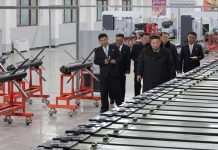DM Monitoring
ANKARA: Over the past few years, there has been a rapprochement with Russia in Turkish diplomacy, with the two countries cooperating in multiple fields and somehow managing to overcome their core differences in perspective on regional issues. The country’s ties with the U.S., however, have been quite rocky, due to obstacles that continue to emerge, stopping the NATO members from achieving the solid alliance they desire. Arguably, 2020 has been the year that this duality in Turkish international relations reached its peak, as Ankara escalated efforts to preserve well-established ties with both sides, striking a balance between the two, over 30 years since the end of the infamous Cold War era.
On May 18, during the peak of the first wave of the pandemic, French political scientist Dominique Moisi wrote an article for Institute Montaigne titled “Coronavirus: History’s Great Divider.”
“The Second World War had led to the Cold War. The war against the coronavirus does not create, but gives a spectacular boost, to the Second Cold War, by dividing men even more where the fight against the epidemic could have, on the contrary, brought them together,” Moisi wrote, bringing the Cold War back into the political discussion while underlining the U.S.’ declining power.
This shift in the international political spectrum has affected Turkey’s diplomatic ties as well, putting the country in a position it had successfully managed to avoid for three decades: having to choose sides between the U.S. and Russia. This dichotomy, gradually becoming more apparent in recent years, reached its peak when the U.S. recently announced its decision to impose sanctions on Turkey over the country’s S-400 missile purchase from Russia.
“The thing that pushed Turkey to buy S-400 missiles was the erosion of trust with the U.S.,” said professor Tarık Oğüzlu, an academic at Antalya Science University, analyzing the parameters that lead to the current situation.
The U.S. announced sanctions earlier this month to penalize Turkey for its procurement of Russia’s advanced S-400 missile defense system, under a U.S. law known as CAATSA which aims to push back against Russian influence. It was the first time that CAATSA had been used to penalize a U.S. ally. The sanctions target Turkey’s Presidency of Defense Industries (SSB), its chief, Ismail Demir, and three other employees. Turkey maintains that its purchase of the S-400s was not a choice but a necessity as it was unable to procure air defense systems from any NATO ally on satisfactory terms. While Washington says the S-400s pose a threat to its F-35 fighter jets and NATO’s broader defense systems. Turkey, however, stressed that the S-400s would not be integrated into NATO systems and pose no threat to the alliance or its armaments.
“Turkey plays with the balance of power, which is a game that is necessary for the country. “Turkey both says it sides with NATO and it is not obliged to NATO, which is what balanced diplomacy looks like,” Oğuzlu continued.
But this is not the first time Turkey has sought a balance between nations.
Remaining neutral for most of World War II, Turkey declared war against Germany shortly before it drew to a close. Due to the emergence of the Soviet Union as an expansionist power, Turkey made the conscious decision to side with the Western Bloc, becoming a NATO member and benefiting from the Marshall aid provided by the U.S. at the time.
Although some critical topics such as the Cyprus crisis and the infamous Johnson letter forced Turkey to reconsider its full commitment to the U.S. alliance while mending ties with the Soviets, the country remained with the Western Bloc until the end of the Cold War in 1991.
“During most of the Cold War period, Turkey remained in the backwaters of international politics,” says academic Kemal Kirişçi in his 2016 article “Changes in Turkish Foreign Policy Behaviour.”
“Turkey, throughout this period, was a staunch ally of the Western Bloc. Basically, the parameters of its foreign policy behavior were determined by the strategic exigencies of its leading NATO allies. The only few times that Turkey made it to the forefront of international politics was usually in the context of crises in its relations with Greece or Cyprus,” he said.
“Yet,” he continued, “since the end of the Cold War, Turkey suddenly appears to have been propelled to the forefront of international politics.”




